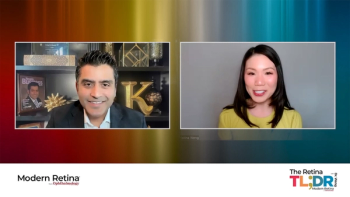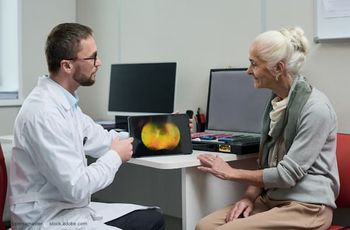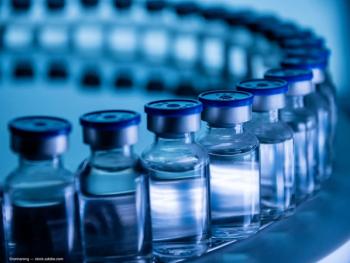
PHOTON, PULSAR trials: Aflibercept meets primary endpoints in safety, efficacy
Regeneron announced that the primary endpoints were met in two pivotal trials investigating novel aflibercept 8 mg with 12- and 16-week dosing regimens in patients with diabetic macular edema and wet age-related macular degeneration.
Regeneron Pharmaceuticals announced that the primary endpoints were met in two pivotal trials investigating novel aflibercept 8 mg (Eylea) with 12- and 16-week dosing regimens in patients with diabetic macular edema (DME) and wet age-related macular degeneration (AMD).
The PHOTON trial in DME and the PULSAR trial in wet AMD both demonstrated that aflibercept 8 mg 12- and 16-week dosing regimens achieved non-inferiority in vision gains compared to the EYLEA 8-week dosing regimen. In these trials, the safety of aflib"Over the last decade, EYLEA has become the standard-of-care for diabetic macular edema and wet age-related macular degeneration," said George D. Yancopoulos, M.D., Ph.D., President and Chief Scientific Officer at Regeneron, and a principal inventor of aflibercept. "The results of these trials with our novel aflibercept 8 mg formulation demonstrated that a remarkably high percentage of patients were maintained on 12- and 16-week dosing intervals through week 48, suggesting aflibercept 8 mg has the potential to be as paradigm-changing as EYLEA."
Detailed efficacy and safety data from PHOTON and PULSAR are planned for presentation at an upcoming medical meeting.
Aflibercept 8 mg is being jointly developed by Regeneron and Bayer AG. In the U.S., Regeneron maintains exclusive rights to EYLEA and aflibercept 8 mg. Bayer has licensed the exclusive marketing rights outside of the U.S., where the companies share equally the profits from sales of EYLEA.
Aflibercept 8 mg is investigational, and its safety and efficacy have not been evaluated by any regulatory authority.
In both PHOTON and PULSAR, patients with DME and wet AMD were randomized into three treatment groups to receive either: aflibercept 8 mg every 12 weeks, aflibercept 8 mg every 16 weeks, or EYLEA every 8 weeks. Patients treated with aflibercept 8 mg in both trials had 3 initial monthly doses, and patients treated with aflibercept received 5 initial monthly doses in PHOTON and 3 in PULSAR. In the first year, patients in the aflibercept 8 mg groups could have their dosing intervals shortened down to an every 8-week interval if protocol-defined criteria for disease progression was observed. Intervals could not be extended until the second year of the study, with those results still to be assessed.
Patients in all aflibercept groups maintained a fixed 8-week dosing regimen throughout their participation in the trials. The lead sponsors of the trials were Regeneron for PHOTON and Bayer for PULSAR. Aflibercept 8 mg was consistent with the established safety profile of aflibercept. Regeneron and Bayer will submit these data to regulatory authorities in countries around the world.
"These pivotal aflibercept 8 mg trials demonstrated that nearly 90% of patients with diabetic macular edema and almost 80% of patients with wet age-related macular degeneration were able to maintain a 16-week dosing regimen," said David Brown, MD, FACS, director of research at Retina Consultants of Texas in the U.S. and a trial investigator. "These unprecedented durability data coupled with a safety profile consistent with that of Eylea support aflibercept 8 mg as a potential new standard-of-care in these diseases."
"These groundbreaking results are excellent news for patients. These outcomes have shown that aflibercept 8 mg not only improved vision with less frequent injections, but also demonstrated a similar safety profile to Eylea," said Jean-François Korobelnik, MD, PhD, professor of Ophthalmology and Head of the Department of Ophthalmology at University Hospital of Bordeaux in France and a trial investigator.
PHOTON (N=658) and PULSAR (N=1,009) are double-masked, active-controlled pivotal trials that are being conducted in multiple centers globally. At 48 weeks, >90% of patients in all dosing groups in both trials completed the treatment period with efficacy results as follows:
The safety of aflibercept 8 mg was similar to EYLEA in both trials, and consistent with the well-established safety profile of EYLEA from previous clinical trials. In both trials, there were no new safety signals for aflibercept 8 mg and EYLEA, and no cases of retinal vasculitis, occlusive retinitis or endophthalmitis. Key safety results* were as follows:
"Over the last decade, EYLEA has become the standard-of-care for diabetic macular edema and wet age-related macular degeneration," said George D. Yancopoulos, M.D., Ph.D., President and Chief Scientific Officer at Regeneron, and a principal inventor of aflibercept. "The results of these trials with our novel aflibercept 8 mg formulation demonstrated that a remarkably high percentage of patients were maintained on 12- and 16-week dosing intervals through week 48, suggesting aflibercept 8 mg has the potential to be as paradigm-changing as EYLEA."
Detailed efficacy and safety data from PHOTON and PULSAR are planned for presentation at an upcoming medical meeting.
Aflibercept 8 mg is being jointly developed by Regeneron and Bayer AG. In the U.S., Regeneron maintains exclusive rights to EYLEA and aflibercept 8 mg. Bayer has licensed the exclusive marketing rights outside of the U.S., where the companies share equally the profits from sales of EYLEA.
Aflibercept 8 mg is investigational, and its safety and efficacy have not been evaluated by any regulatory authority.
In both PHOTON and PULSAR, patients with DME and wet AMD were randomized into three treatment groups to receive either: aflibercept 8 mg every 12 weeks, aflibercept 8 mg every 16 weeks, or EYLEA every 8 weeks. Patients treated with aflibercept 8 mg in both trials had 3 initial monthly doses, and patients treated with aflibercept received 5 initial monthly doses in PHOTON and 3 in PULSAR. In the first year, patients in the aflibercept 8 mg groups could have their dosing intervals shortened down to an every 8-week interval if protocol-defined criteria for disease progression was observed. Intervals could not be extended until the second year of the study, with those results still to be assessed.
Patients in all aflibercept groups maintained a fixed 8-week dosing regimen throughout their participation in the trials. The lead sponsors of the trials were Regeneron for PHOTON and Bayer for PULSAR.
Newsletter
Keep your retina practice on the forefront—subscribe for expert analysis and emerging trends in retinal disease management.




























